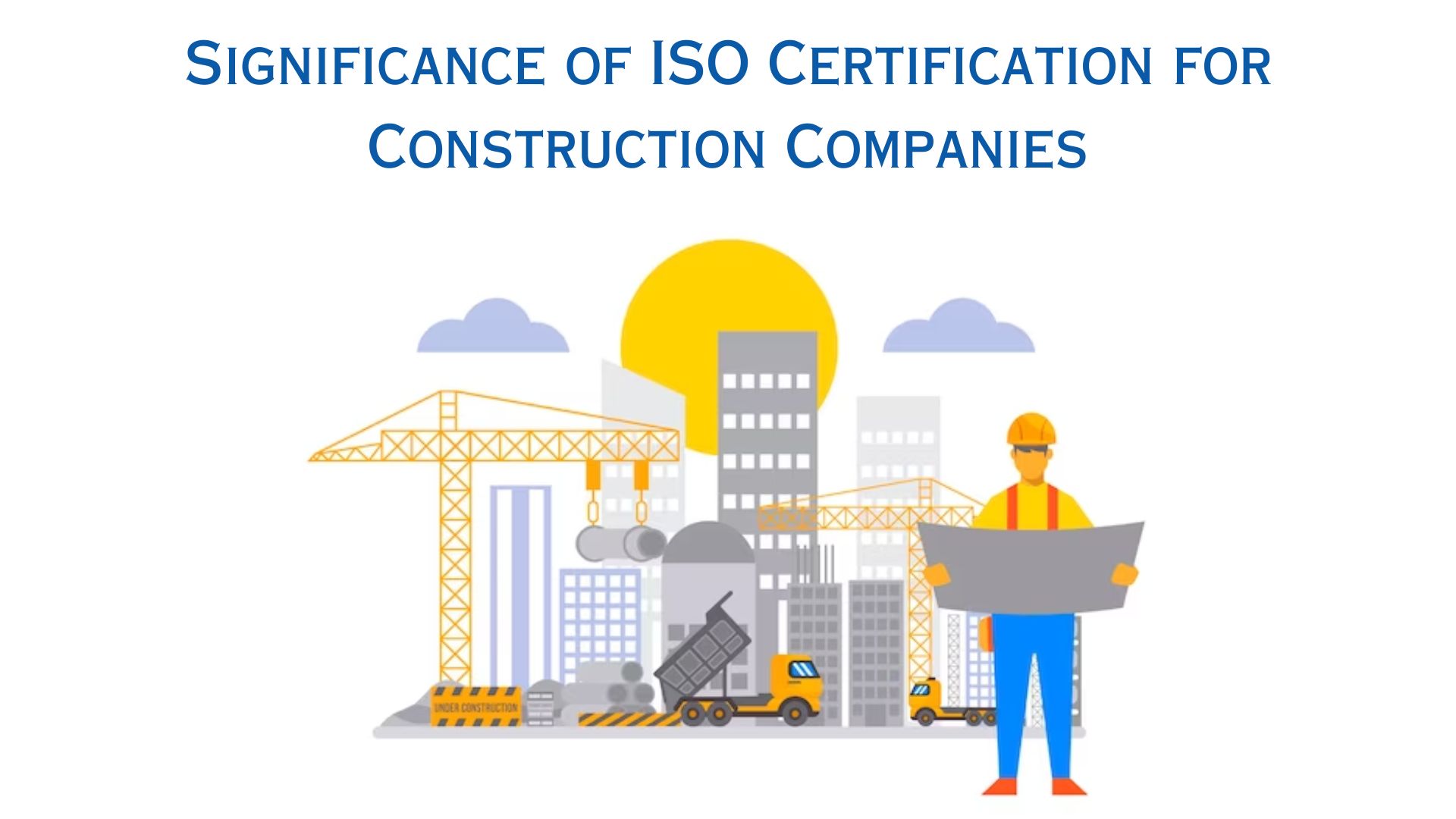Introduction:
In the dynamic and competitive landscape of the construction
industry, ensuring quality, efficiency, and safety is paramount. In this
context, ISO certification has emerged as a crucial benchmark for construction
companies aiming to distinguish themselves and demonstrate their commitment to
best practices. The International Organization for Standardization (ISO)
provides a globally recognized framework that, when implemented effectively,
can significantly enhance a construction company's reputation, operational
efficiency, and overall performance.
Understanding ISO
Certification:
ISO certification is a formal recognition that a company
adheres to the standards set by the International Organization for
Standardization. The ISO standards relevant to the construction industry
include ISO 9001 (Quality Management), ISO 14001 (Environmental Management),
and ISO 45001 (Occupational Health and Safety). These certifications validate
that a construction company has established and maintains robust management
systems aligned with international best practices.
Benefits of ISO
Certification for Construction Companies:
1. Enhanced Quality
Management:
ISO 9001
certification ensures that a construction company has implemented effective
quality management systems. This involves standardized processes for project
planning, execution, and monitoring, leading to improved quality control and
customer satisfaction. Consistent adherence to ISO 9001 standards enhances a
company's ability to deliver projects on time and within budget.
2. Environmental
Responsibility:
ISO 14001
certification focuses on environmental management, emphasizing sustainable
practices and minimizing the environmental impact of construction activities.
This certification is particularly relevant in an era where environmental
concerns are at the forefront of global discourse. Companies with ISO 14001
certification demonstrate their commitment to responsible and sustainable
construction practices.
3. Occupational
Health and Safety Compliance:
ISO 45001
certification is crucial for construction companies prioritizing the health and
safety of their workforce. This certification ensures the establishment of
comprehensive occupational health and safety management systems, reducing the
risk of accidents, injuries, and associated legal liabilities. It also fosters
a culture of safety within the organization.
4. Global Recognition
and Market Access:
ISO certification
is internationally recognized, providing construction companies with a competitive
edge in the global market. Many clients and partners prioritize working with
ISO-certified firms, considering it a reliable indicator of professionalism,
reliability, and adherence to best practices. ISO certification, therefore,
opens doors to new opportunities and collaborations.
5. Improved
Operational Efficiency:
Implementing ISO
standards often leads to streamlined processes and increased efficiency. The
focus on continuous improvement inherent in ISO certifications encourages
companies to identify and address inefficiencies, resulting in cost savings and
optimized resource utilization.
6. Risk Mitigation:
ISO certification
helps construction companies identify and mitigate risks associated with
quality, environmental impact, and occupational health and safety. By having
robust systems in place, companies are better equipped to handle unexpected
challenges, ensuring resilience in the face of uncertainties.
Which ISO certificate
is beneficial for Construction Companies?
Construction companies can benefit from several ISO
certifications, each focusing on different aspects of their operations. The
most relevant ISO certifications for construction companies include:
1. ISO 9001: Quality Management System (QMS) Certification Benefits::
- Demonstrates
commitment to quality and customer satisfaction.
- Enhances
operational efficiency through standardized processes.
- Improves
project management and reduces errors.
- Increases
competitiveness by meeting international quality standards.
2. ISO 14001: Environmental Management System (EMS)
Certification Benefits::
- Demonstrates
commitment to environmental sustainability.
- Reduces the
environmental impact of construction activities.
- Attracts
environmentally conscious clients and stakeholders.
- Ensures
compliance with environmental regulations.
3. ISO 45001: Occupational Health and Safety Management
System (OHSMS) Certification Benefits::
- Prioritizes the
health and safety of the workforce.
- Reduces the
risk of accidents, injuries, and occupational illnesses.
- Demonstrates
compliance with health and safety regulations.
- Enhances the
company's reputation for responsible business practices.
4. ISO 27001: Information Security Management System (ISMS)
Certification Benefits:
- Ensures the
security of sensitive information and data.
- Demonstrates
commitment to protecting client and stakeholder information.
- Mitigates the
risk of data breaches and cyber threats.
- Attracts
clients who prioritize information security.
5. ISO 50001: Energy Management System (EnMS) Certification Benefits::
- Demonstrates
commitment to energy efficiency.
- Reduces energy
consumption and costs.
- Attracts
environmentally conscious clients.
- Aligns with
global energy management best practices.
6. ISO 55001: Asset Management System Certification Benefits::
- Optimizes the
management of construction assets.
- Enhances asset
performance and longevity.
- Ensures
cost-effective maintenance and operation.
- Aligns with
best practices in asset management.
Choosing the right combination of ISO certifications depends
on the specific goals, priorities, and characteristics of a construction
company. Many companies pursue a combination of certifications to
comprehensively address quality, environmental, health and safety, and other
relevant aspects of their operations.
It's essential for construction companies to carefully
assess their needs, regulatory requirements, and client expectations before
deciding on the most suitable ISO certifications for their business. The
successful implementation of these standards not only enhances a company's
overall performance but also contributes to its reputation and competitiveness
in the construction industry.
Conclusion:
In an era where stakeholders demand transparency,
accountability, and sustainability, ISO certification has become a valuable
asset for construction companies. Beyond meeting regulatory requirements, ISO
certifications position these companies as industry leaders committed to
excellence in quality, environmental responsibility, and occupational health
and safety. As the construction industry continues to evolve, obtaining and
maintaining ISO certification in Delhi is a strategic investment that pays dividends in
terms of reputation, client trust, and long-term success.

